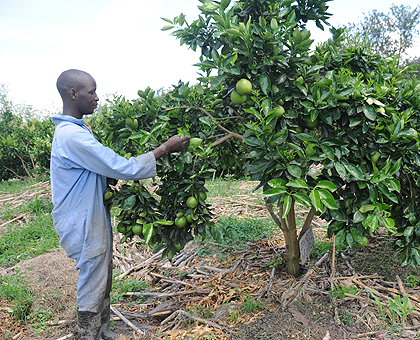Although most African countries depend on agriculture as the backbone of their economies, a lot needs to be done to turn around this important sector.


Although most African countries depend on agriculture as the backbone of their economies, a lot needs to be done to turn around this important sector. Prof. Ben Kiregyera, a principal consultant statistician, said African countries might not achieve the most of the Millennium Development Goals as most of them are linked to agriculture."If there are no statistics on output, input, import and export of agriculture produce, then there will be no increase in productivity, no realistic target, no proper planning and the implementation of plans on agriculture will not be done,” Prof Kiregyera explained to The New Times.He said countries have failed to honour the commitment made in the Maputo protocol, of increasing the agriculture funding to at least ten per cent of total budgets. The Professor now wants donors to push governments to fund the priority sectors.He was speaking yesterday in Kigali at the official launch of a five-year strategic plan for improving statistics on food security, the Sustainable and Rural Development Action Plan for Africa. The plan indicates the importance of the agricultural sector that demands that its planning, management, and monitoring be based on sound evidence. This, in turn, requires the sustained availability of comprehensive, reliable, up-to-date, and consistent statistical data.Unfortunately, agricultural statistical systems and data are in a sorry state in many African countries, the systems are weak, uncoordinated, insufficiently resourced, and essentially unsustainable. The plan continues to indicate that agriculture plays a central and strategic role in Africa’s development. Indeed, it is the key to economic growth, increased incomes, improved living standards, poverty eradication, and enhanced food security. The launch of the Action Plan will be followed by a three-day workshop organised by the National Institute of Statistics of Rwanda in collaboration with other development partners. Stephane Mugabe, the principal Research Statistician, said the Global Strategy for Improving Agricultural and Rural Statistics is in response to the many challenges of meeting user needs for agricultural statistics in developing countries, Africa in particular. "The strategy was produced and endorsed in February 2010 by the United Nations Statistical Commission (UNSC). With the purpose to provide a framework and methodology that will help improve the availability and quality of national and international food and agricultural statistics, to guide policy analysis and decision making in the 21st century,” Mugabe explained. Although Rwanda carries out national agricultural and post harvest surveys, the country has not carried out an agricultural census. A report, prepared by the FAO, based on the responses of 30 African countries (mostly Anglophone), indicated that almost all countries surveyed (about 96 per cent) had some kind of legal framework for general statistics in place but only about 64 per cent had a separate framework for agriculture statistics. Furthermore, only about 30 per cent of the countries had active Advisory Committees to guide the development of agricultural statistics. About 80 per cent of the countries had an official forum for dialogue between producers and users of agriculture statistics, but these functioned on an ad hoc basis. About 75 per cent of the countries had a National Strategy for Development of Statistics (NS DS) in place, of which only 68 per cent were operational with a program of activities for general statistics.


